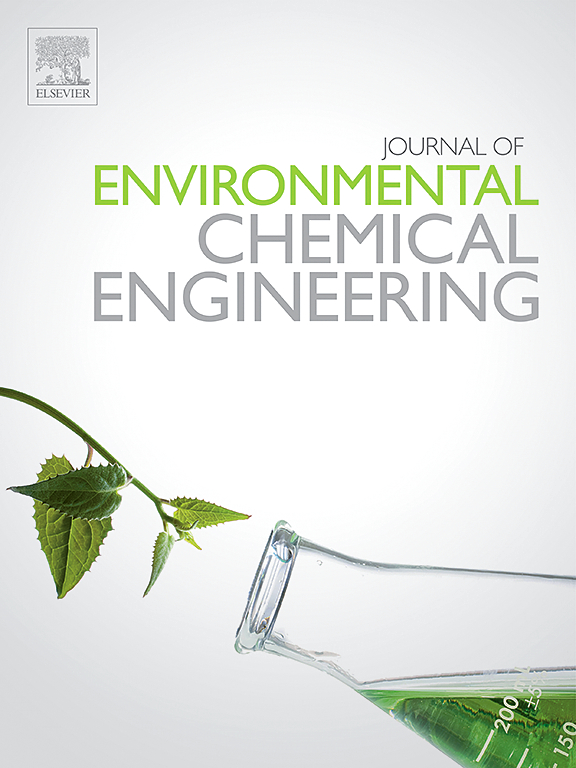Degradation of aqueous organic pollutants by dual oxidant advanced oxidation processes: A comprehensive review
IF 7.2
2区 工程技术
Q1 ENGINEERING, CHEMICAL
引用次数: 0
Abstract
The advanced oxidation process (AOP) has been extensively studied for treatment of aqueous organic pollutants, and various oxidants have been utilized in AOP. In some cases, the combinations of two oxidants can help to boost the performance of AOP. In this review, the recent works concerning the applications of dual oxidant AOP for the degradation of organic pollutants have been summarized comprehensively. Various dual oxidant systems have been discussed, including O3/peroxides, O3/persulfates, peroxides/persulfates, periodate/peroxides, permanganate-based, ferrate-based and others. For each dual oxidant system, the reaction mechanisms and synergy effects as well as the effects of oxidant dosage and pH have been discussed in detail. Catalysts and/or external energy sources helped to enhance the performance of dual oxidant systems, which have also been summarized and discussed systematically. This review further highlights the current achievements and hurdles for dual oxidant AOPs, and also proposes recommendations for future works, such as more attentions on pollutant-specific performances of these systems and applications for real wastewater treatment, further investigations on the performances of new catalysts and cost analysis as well as more focus on the specific properties of dual oxidant systems.
双氧化剂高级氧化工艺降解水体有机污染物:综述
人们对高级氧化工艺(AOP)处理水体有机污染物进行了广泛研究,并在 AOP 中使用了各种氧化剂。在某些情况下,两种氧化剂的组合有助于提高 AOP 的性能。本综述全面总结了近期有关应用双氧化剂 AOP 降解有机污染物的研究成果。文中讨论了各种双氧化剂系统,包括 O3/过氧化物、O3/过硫酸盐、过氧化物/过硫酸盐、高锰酸盐/过氧化物、高锰酸盐基、铁酸盐基等。对于每种双氧化剂系统,都详细讨论了其反应机制和协同效应,以及氧化剂用量和 pH 值的影响。催化剂和/或外部能源有助于提高双氧化剂系统的性能,本综述也对此进行了系统的总结和讨论。本综述进一步强调了双氧化剂 AOPs 目前取得的成就和面临的障碍,并对今后的工作提出了建议,如更加关注这些系统的污染物特定性能和在实际废水处理中的应用,进一步研究新催化剂的性能和成本分析,以及更加关注双氧化剂系统的特定性能。
本文章由计算机程序翻译,如有差异,请以英文原文为准。
求助全文
约1分钟内获得全文
求助全文
来源期刊

Journal of Environmental Chemical Engineering
Environmental Science-Pollution
CiteScore
11.40
自引率
6.50%
发文量
2017
审稿时长
27 days
期刊介绍:
The Journal of Environmental Chemical Engineering (JECE) serves as a platform for the dissemination of original and innovative research focusing on the advancement of environmentally-friendly, sustainable technologies. JECE emphasizes the transition towards a carbon-neutral circular economy and a self-sufficient bio-based economy. Topics covered include soil, water, wastewater, and air decontamination; pollution monitoring, prevention, and control; advanced analytics, sensors, impact and risk assessment methodologies in environmental chemical engineering; resource recovery (water, nutrients, materials, energy); industrial ecology; valorization of waste streams; waste management (including e-waste); climate-water-energy-food nexus; novel materials for environmental, chemical, and energy applications; sustainability and environmental safety; water digitalization, water data science, and machine learning; process integration and intensification; recent developments in green chemistry for synthesis, catalysis, and energy; and original research on contaminants of emerging concern, persistent chemicals, and priority substances, including microplastics, nanoplastics, nanomaterials, micropollutants, antimicrobial resistance genes, and emerging pathogens (viruses, bacteria, parasites) of environmental significance.
 求助内容:
求助内容: 应助结果提醒方式:
应助结果提醒方式:


